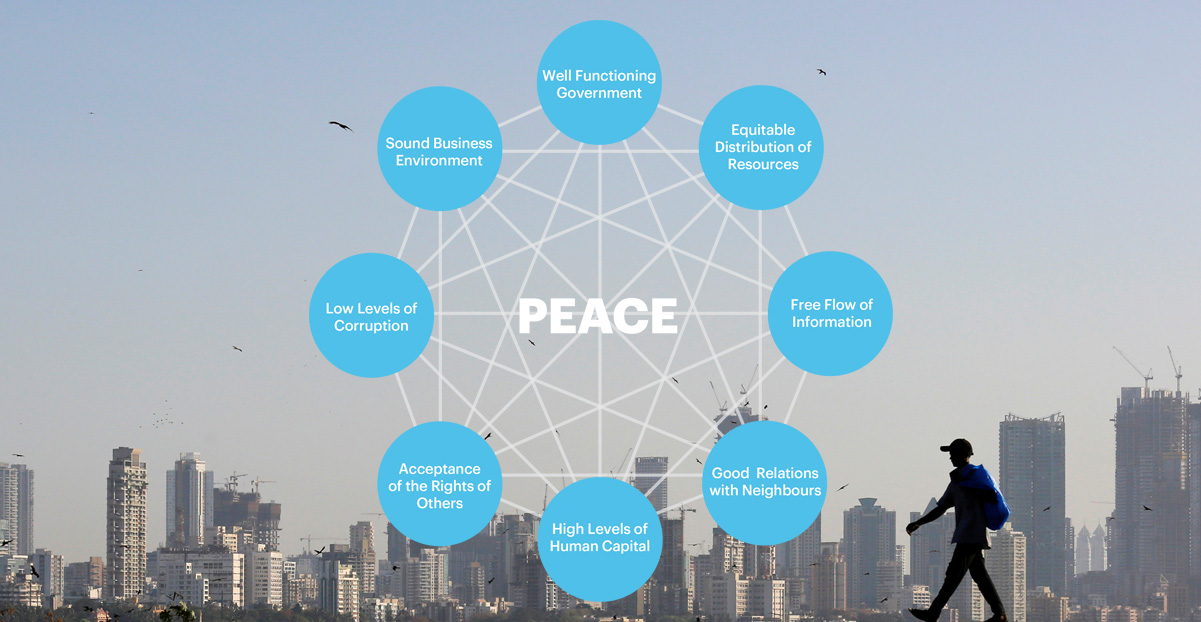The Institute for Economics & Peace (IEP) and Greenfish kicked off their 3-part webinar series Positive Peace and Climate Change Mitigation with the first installment: “How can Positive Peace make business more profitable?”. The panel featured Ms. Flore Andersen, Head of Strategic Advisory at Greenfish, and Mr. Steve Killelea, Founder and Executive Chairman of the Institute for Economics & Peace. Through this first webinar, our speakers and audience investigated the link between Positive Peace, sustainability, and its relevance to the business world.
Building on the Business & Positive Peace Report 2021, produced by the Institute for Economics & Peace, there is an inherent link between positive dynamic of businesses and increasing levels of Positive Peace within a country. The economic activities in countries with improving levels of Positive Peace are more likely to be prosperous.
Compared to the global average, countries achieving high levels of Positive Peace benefited from a GDP growth by 33%, business activity was higher by a two fold, corporate profits were 27% higher and international trade increased by 32%. In contrast, inflation rates were four times more volatile in countries where Positive Peace deteriorated. Institutions tend to be more transparent, representative and efficient in more peaceful settings.
Legal systems dealing with lower numbers of crime allow institutions to better focus on other pressing areas, including administrative matters for businesses and corporate cases. On the other hand, conflict and violence can limit business activities, opportunities for investment and entrepreneurship, as well as the economy at large.
In 2021, the economic impact of violence was estimated at $14.4 trillion, representing $1,895 cost per person.

According to the International Growth Centre, a rise of 1°C in global temperature would already lead to conflicts between groups increasing by 11.3% and conflicts between individuals increasing by 2.4%. This relationship can be illustrated by many examples from across the world. For instance, the severe drought currently being experienced in the Horn of Africa is causing an estimated 13 million people to face hunger. This example is a good illustration of how climate change, by disrupting weather patterns and the water cycle, is causing stress on communities and leading to increased friction and conflicts.
But climate change is not a distant issue that is only present in a few countries. In Belgium, rains are becoming erratic, with less frequent but more intense precipitations. In consequence, water does not seep into the soil as well, leading to groundwater levels decreasing. This means that even though Belgium does not experience droughts as arid climates do, we are still prone to water scarcity as soils are no longer able to retain water. This is why it is important for companies, but also individuals, to understand that we are dependent on our environment, but we are also the actors of it.
Overall, this webinar explored how economic performance and peace are mutually reinforcing. Positive Peace or socio-economic resilience can be an accurate predictor for investors to comprehensively assess potential countries for investment and business opportunities. Beyond that, Positive Peace offers the private and public sectors new ways of developing meaningful policies and sustainable initiatives.
Watch the full webinar here:
Download the 2022 Positive Peace Index report .